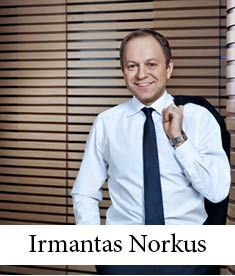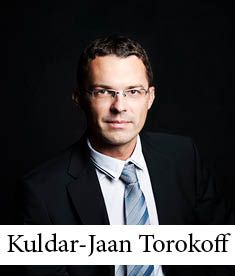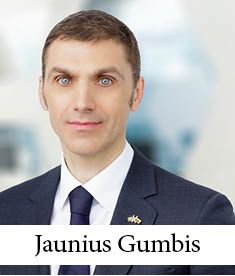On May 18 and 19, 2015, separate press releases came across the wire, announcing that the Lithuanian and Latvian offices of two of the top pan-Baltic alliances – Raidla, Lejins & Norcous (RLN) and Lawin – had, in essence, dissolved, traded Estonian offices, and reorganized. The former Lithuanian and Latvian members of RLN and the former Estonian member of Lawin re-formed as Cobalt, while the former Lithuanian and Latvian offices of Lawin and the former Estonian office of RLN re-formed as Ellex.
Complicated? Well, confusing, at least. And despite the curious names (Ellex stands for Estonia Latvia Lithuania EXcellence, and as for Cobalt, Dace Slava-Tomsone, the Managing Partner of Cobalt Latvia, laughs that “we had to explain to certain people that no, this is not a mining organization”), the news that two of the best-known and most successful legal alliances in the Baltics would be exchanging offices and abandoning two of the strongest brands in the region continues to reverberate.
So Why the Reshuffling?
Eugenia Sutkiene, the Managing Partner of Tark Grunte Sutkiene in Vilnius, believes that the reason can be found in the merger of Baltic Legal Solutions’ Lithuanian office with her own firm back in October, 2014. Although the markets had been quiet for several years before that, she says, “our merger kickstarted the consolidation of the market.” And she claims that her firm’s success since the merger forced her competitors’ hands. “They couldn’t sit on this situation any more,” Sutkiene says. “They had to react.”
Maybe. Unsurprisingly, both Cobalt and Ellex offer different – though separate – explanations for the change.
Cobalt’s Integration Vision
 Irmantas Norkus of Cobalt in Lithuania explains that the re-formation was necessary because financial integration – including sharing of equity between partners – is “the only way to go, [and] is the ultimate goal we want to achieve.” He notes that, although Sorainen is currently the only integrated pan-Baltic firm at the top of the market, “the Big 4 accounting firms are integrated, our clients – the banks and insurance companies – are integrated, [and] the international firms outside the Baltics are integrated.” Norkus believes the analysis points only one direction: “There’s no way you can be efficient and compete without being integrated. That will become the prevailing practice in 2-3-4 years. To me, integration is a must.” Norkus explains that he and his colleagues in Riga saw the writing on the wall several years ago and concluded that “the obvious solution to us was to merge our offices into one and consolidate our services into one, leading to more efficiency.”
Irmantas Norkus of Cobalt in Lithuania explains that the re-formation was necessary because financial integration – including sharing of equity between partners – is “the only way to go, [and] is the ultimate goal we want to achieve.” He notes that, although Sorainen is currently the only integrated pan-Baltic firm at the top of the market, “the Big 4 accounting firms are integrated, our clients – the banks and insurance companies – are integrated, [and] the international firms outside the Baltics are integrated.” Norkus believes the analysis points only one direction: “There’s no way you can be efficient and compete without being integrated. That will become the prevailing practice in 2-3-4 years. To me, integration is a must.” Norkus explains that he and his colleagues in Riga saw the writing on the wall several years ago and concluded that “the obvious solution to us was to merge our offices into one and consolidate our services into one, leading to more efficiency.”
Unfortunately, not everyone in his previous alliance agreed. “Riga and Vilnius wanted to move towards integration, while Tallinn preferred the status quo.” As a result, “it became impossible to reconcile these views, and it became clear we had to separate and pursue our own strategies. So we peacefully agreed to terminate the RLN alliance.”
And indeed, Norkus’s enthusiasm for full integration is shared both by new Estonian Managing Partner Martin Simovart (who took that role over from former MP Peter Lepik – who remains on board as Counsel – simultaneous with the alliance re-formation) and Latvian Managing Partner Dace Slava-Tomsone, who took over the reins of that office from Founding Partner Girts Lejins two years ago.
 In other words, the analysis of Kuldar-Jaan Torokoff, Managing Partner at Fort Legal in Estonia, seems directly on-point: “When it comes to integration, one of the critical first steps is firm founders letting go of the management of their firms. You need this generation swap before real integration happens because you need to be young enough to see the long term benefits of the integration rather than the autonomy you are giving up, which you enjoyed for so many years.”
In other words, the analysis of Kuldar-Jaan Torokoff, Managing Partner at Fort Legal in Estonia, seems directly on-point: “When it comes to integration, one of the critical first steps is firm founders letting go of the management of their firms. You need this generation swap before real integration happens because you need to be young enough to see the long term benefits of the integration rather than the autonomy you are giving up, which you enjoyed for so many years.”
Ellex Prefers the Alliance Model
While Cobalt says they initiated the change to facilitate their pursuit of the “Sorainen Model” (profit sharing across Baltic offices), the partners at Ellex say that in fact it was they who initiated the change, as a means of improving their service to clients by joining with their new partners in Tallinn, who many experts agree are among the best in the region. According to Partner Zilvinas Zinkevicius at Valiunas Ellex in Lithuania: “The goal is to provide seamless Pan-Baltic service, with a new and improved level of service.” And Filips Klavins, the Managing Partner of Klavins Ellex in Riga, says the purpose of the change was simple: “We were seeking greater quality.”
 Partner Jaunius Gumbis of Valiunas Ellex in Lithuania agrees that, “the goal has always been to provide the best service to clients.” He refers to that goal in explaining the change: “We felt a little bit that we had to improve. We are thankful for our Tallinn partners during these 10 years. We achieved a lot, and we enjoyed it. But sometimes, even when everything is fine, you need to move from good to great.”
Partner Jaunius Gumbis of Valiunas Ellex in Lithuania agrees that, “the goal has always been to provide the best service to clients.” He refers to that goal in explaining the change: “We felt a little bit that we had to improve. We are thankful for our Tallinn partners during these 10 years. We achieved a lot, and we enjoyed it. But sometimes, even when everything is fine, you need to move from good to great.”
In contrast to their counterparts at Cobalt, the Partners at Ellex say they have no interest in pursuing what’s known as the Sorainen Model. Filip Klavins says, “It just comes down to the best service for a client. The client doesn’t care if the offices are sharing profits or not.”
Conclusion?
Unsurprisingly, both of the new alliances (Ellex refers to itself as a “circle”) claim it was their side that initiated the change, putting forward competing explanations in support. At the end of the day, however, Irmantas Norkus prefers to keep the conversation positive. He says that everyone got what they wanted: “We had differences of opinion [among the offices in our alliance], and they did as well – so now it’s a happy ending for everybody.”
This Article was originally published in Issue 2.3. of the CEE Legal Matters Magazine. If you would like to receive a hard copy of the magazine, you can subscribe here.

